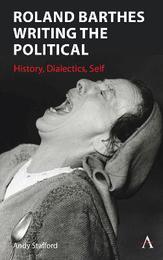
|
Roland Barthes Writing the Political: History, Dialectics, Self
Hardback
Main Details
| Title |
Roland Barthes Writing the Political: History, Dialectics, Self
|
| Authors and Contributors |
By (author) Andrew Stafford
|
| Physical Properties |
| Format:Hardback | | Pages:278 | | Dimensions(mm): Height 229,Width 153 |
|
| Category/Genre | Literary theory |
|---|
| ISBN/Barcode |
9781785278976
|
| Classifications | Dewey:801.95 |
|---|
| Audience | | Professional & Vocational | |
|---|
|
Publishing Details |
| Publisher |
Anthem Press
|
| Imprint |
Anthem Press
|
| Publication Date |
8 November 2022 |
| Publication Country |
United Kingdom
|
Description
With typical rhetorical flourish and beholden to paradox, Roland Barthes defines his work on 'myth' as an attempt to 'define things'; and yet he is known foremost for his work on language. The aim of this book is to take 'things' here as social relations, objects and other human beings with which the self interacts. It does so via language. And language in Barthes's conception is double: alienating, alienated on the one side; liberating, inspiring on the other. It is this double that we investigate in this book: A spectre is haunting Barthes studies, the spectre of dialectics; and the spectral presence of dialectics is what we will define in this book as the Barthesian 'spirit', in both senses of the word, that is, haunting his analyses and, at once, providing us with a double approach. 'I have tried to define things, not words' (Barthes 2009, 131n1).
Author Biography
Renowned specialist of Roland Barthes, Andy Stafford has co-edited Barthes's 1968-1969 seminar notes on Sarrasine. His work on Barthes is translated into Chinese, French and Portuguese.
Reviews'This book is daring yet meticulous intervention into the myth of 'an apolitical Barthes' and a convincing foregrounding of 'other spaces for critique to take place'. This enables the author to cast new light on a set of intertextual affinities between Barthes and Marx, thereby reinterpreting the former's work in the context of a uniquely Marxist materialism or the 'Capital of linguistics'. What emerges is a new insight into the multiple significances of Barthes's preoccupation with paradox and dialectic.'-Fuhito Endo, Seikei University, Tokyo. 'Stafford shatters a common assumption about Barthes's writing. Against the grain of the dominant strain in Barthes scholarship that views him as an aesthete whose work has little-to-no political dimension, Stafford convincingly demonstrates that the political is a key component of his work. The aesthete is dead - long live the political Barthes!'-Jeffrey R. Di Leo,Co-editor, Understanding Barthes, Understanding Modernism; Professor of English and Philosophy, University of Houston, USA; Series editor, Anthem symploke Studies in Theory. 'Stafford brilliantly bridges the gap between a Marxist Barthes debunking bourgeois myths and a later hedonist by deploying a concept of un-dialectics thank to which his original political vision emerges, dialoguing with Lukacs, Goldmann, Thompson and Benjamin, a vision attuned to today's preoccupations with tolerance, social justice and the question of how to "live together."' -Jean-Michel Rabate,University of Pennsylvania, and American Academy of Arts and Sciences, USA.
|